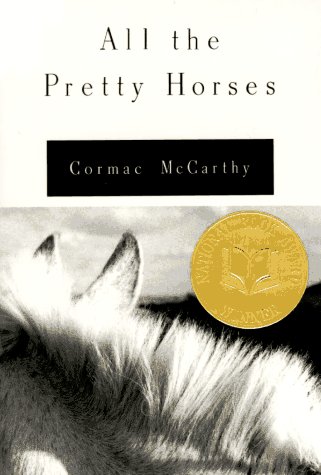Everything is pretty simple here. It’s just a story about a boy and another boy and Jimmy Blevins. The same story as all the stories, all the good ones anyway. Newborn and old as time. Life and death and boredom and youth and horror and adventure and the kind of sweetness and beauty where beauty is too pale a word. All the darkness of it. All the comedy of it. The things that claw to the surface of us to breathe. And us, whittled and raw and scarred up and healing.
At a technical level it’s brilliant, the way McCarthy puts every word together. But what I possibly love more than that is how McCarthy wrote this story to write this story. Not for you or me or anyone. There’s something pure here that tends to not exist outside of old books, far removed from the wants and lives of their writers. But McCarthy’s wants and life are all here. You only need to see a minute of the man talk to know that. And he’s just telling a story, the story he’d want to hear and about the only things that interest him. Life and death and wildness. It’s the only kinds of things that interest me these days too. The only kinds of stories I crave. It’s there, for and not for us, for you or me to read or not read, for me to come alive or for you to pass it by. It’s no matter. It’s just there. It’s there for anyone the same way.
But I could say two thousand words and it wouldn’t be enough, wouldn’t come near to what I want to say. So I’ll let McCarthy say it instead. All of his words, like coming up for air.
He rode with the sun coppering his face and the red wind blowing out of the west. He turned south along the old war trail and he rode to the crest of a low rise and dismounted and dropped the reins and walked out and stood like a man come to the end of something.
There was an old horseskull in the brush and he squatted and picked it up and turned it in his hands. Frail and brittle. Bleached paper white. He squatted in the long light holding it, the comicbook teeth loose in their sockets. The joints in the cranium like a ragged welding of the bone plates. The muted run of sand in the brainbox when he turned it.
What he loved in horses was what he loved in men, the blood and the heat of the blood that ran them. All his reverence and all his fondness and all the leanings of his life were for the ardenthearted and they would always be so and never be otherwise.
He rode back in the dark. The horse quickened its step. The last of the day’s light fanned slowly upon the plain behind him and withdrew again down the edges of the world in a cooling blue of shadow and dusk and chill and a few last chitterings of birds sequestered in the dark and wiry brush.
And if that was too wide, too earnest, too far removed from the sixteen year old boy and the place it belongs, here’s this:
When they went down to the bunkhouse for dinner the vaqueros seemed to treat them with a certain deference but whether it was the deference accorded the accomplished or that accorded to mental defectives they were unsure.
Maybe like Rawlins or Blevins or John Grady might say, this or any of this is full of shit after all. Read it and then tell me so if you want. But read it.
